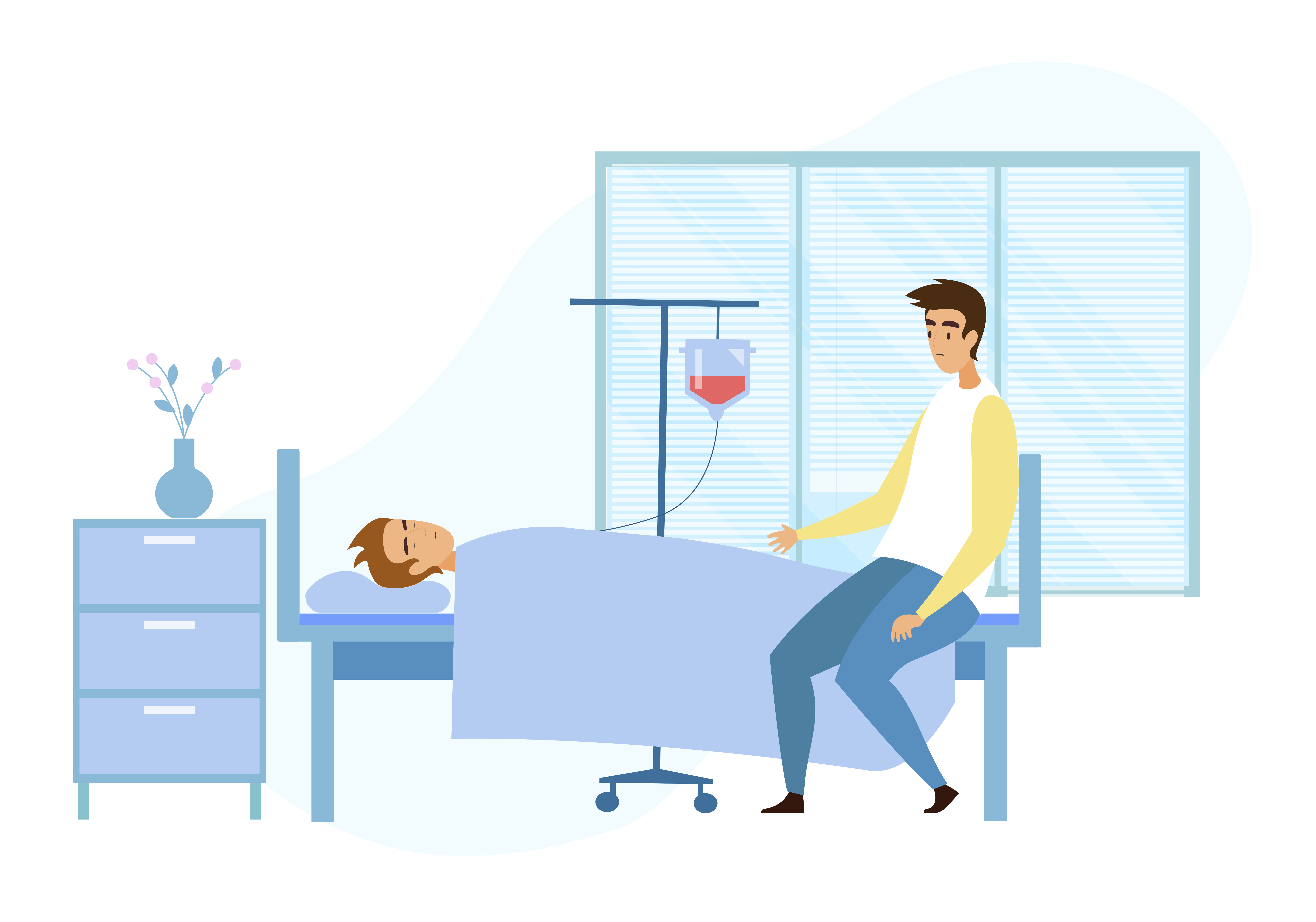Understanding a Serious Illness
Understanding a Serious Illness
A serious illness can affect a person physically, causing changes to their physical appearance and mobility. A serious illness can also cause changes in a person’s mood, behavior, and abilities. It can be distressing when someone you care about is seriously ill.
- Treatment for some illnesses can cause a person to feel very sick, tired, or weak.
- Sometimes people may need surgery and will need to spend time recovering.
- Some people who are very ill may need to stay in the hospital or move to a different place to receive medical care.
- Some illnesses can be treated and cured, or their progression can be stalled, with the help of medicine.
- Some illnesses may not respond to medical intervention and the person may die.
- A person may live a long time or a short time after receiving a diagnosis, depending on what is medically possible.
It can be difficult to see someone’s mood and physical appearance change as they cope with a significant illness.
- You may begin to feel grief during a person’s illness as you see their health decline.
- You may feel grief as you think about a future without them.
- It can help to share your feelings with someone you trust. Sharing through words, pictures, music, or using references to stories or movies can help relieve anxiety.
- You can also ask a trusted person any questions you have about what will happen to the person who is sick, or what will happen to you if the person dies.
- You can have a role in making decisions about your future. Adjusting to any changes that may happen will be easier if you know in advance what might happen and if a plan is in place.

Questions You May Want to Ask About a Person’s Illness
If you have questions about the illness, you can:
- ask the person who is sick,
- ask a healthcare provider, family member, or other support person, and
- search for trustworthy information about the illness from reputable sources online or in books.
As you consider the information, beware that not all of it will be applicable to everyone with that illness. Everyone’s illness and their response to it can be different, and some sources of information are not reliable.
Some questions you might want to ask about a person’s serious illness are:
- Are they in pain?
- What made them sick?
- Will you get sick if you go near them?
- If they need surgery, what is it for and what will it be like for them?
- How long will it take for them to feel better?
- If they are in the hospital, when will they leave?
- Will they recover at home or in another place?
- What can you do to help the person?
- Will the person need medicine and how might that affect them?
- What is the likelihood that the person will die because of their illness?
- How could their serious illness or death affect you?
Sometimes you may not get complete answers to all your questions. There are many reasons why someone who is ill may not be able to give answers, here are some:
- The person may not know the answers.
- They may be feeling uncertainty and anxiety.
- The person may not want to talk about their illness at all.
- They may not want to talk about it at the same time you do.
It is important to respect the ill person’s privacy. If they are unable to provide answers, you can seek out other trusted people who will help you get the information you want, especially if it will affect you.

What to Expect if You Visit Someone in the Hospital
If the sick person is allowed to have visitors and is willing to have them, you can visit them in the hospital during visiting hours. If you haven’t visited a hospital, it can help to communicate with your family, friend, support person, or hospital staff in advance about what you might experience at the hospital. Most hospital websites can provide you with information such as what the place will look like, where things are located, and the times for visiting hours.
Before visiting a hospital, here are some questions you might want to ask:
- Does the person want visitors?
- Will there be machines in the room? What do those machines do and what do they sound like?
- What will the person look like?
- Will they be able to talk?
- Will they be able to get out of bed?
- Will they be awake?
- Will there be other physical changes, like bandages or hair loss?
- How will you let people know when you need a break or are ready to leave?
- What can you bring as a gift for the person?
- What can you bring to provide comfort for yourself if you need it?
- How will you know if or when the person is ready for you to leave? Will they be comfortable telling you?
- How will you know when visiting hours are over? Can you stay in the room when visiting hours are over, or do you need to leave the building when visiting hours are over?
- Does the hospital have other rules that may impact you? What are they?
- Can you talk to other people at the hospital? What if the person has a roommate, can you talk to them?

Planning to Visit the Hospital
What to Bring
Many people who visit someone in the hospital bring small gift to let the person know they are thinking about them and care about their recovery. Ask your friends, family, support person, or hospital staff if it is okay to bring a gift.
Things you may want to bring are:
- a card with a written message such as “Get Well Soon” or “I hope you feel better,”
- flowers,
- balloons, or
- a small gift you know they would like.
Visiting the hospital can be stressful with unfamiliar sights, sounds, smells, and people. If you are worried about what you might experience when you visit, it may be helpful to bring something that helps you cope with the stress. This could be something like earphones to listen to music or an object that you find comforting.
What to Communicate
Common things to communicate to the person who is sick when visiting them in the hospital are:
- “Get well soon,”
- “I hope you feel better,” or
- “Can I bring you anything if I visit again?”
Common topics to communicate about could include:
- sports,
- hobbies,
- family,
- job,
- home life,
- movies and shows, or
- current events.
If you are not sure what to communicate about, that’s okay. Simply being there to visit shows the person that you care about them.

If You Decide Not to Visit the Hospital
If you decide that a visit to the hospital may be too difficult, you may be able to send a “Get Well” card or set up a phone or FaceTime call instead. A family member, friend, or support person can help you send your card without visiting the hospital.
Hospice Care
When a person is very sick and will not get better, you might hear people talking about hospice. Here are some things to know about hospice.
- Being in hospice care means that a person is close to the end of their life and will probably die soon.
- To receive hospice care, doctors have used their best judgment to decide that the person is expected to live for six months or less.
- Hospice care also provides grief support to family members if they need it after the person dies.
- The goal of hospice care is to make the person comfortable.
- A team of healthcare and other professionals work together and make a plan for the person’s care.
- The care plan often involves helpful medications and equipment.
- Most hospice care occurs where a person is living, which could be their private residence, a nursing home, or a similar facility.
- Hospice care can also be provided in a hospital or in something known as a hospice house.
Hospice care is not for people with a chronic health condition unless they are close to death. Many people live for years or their entire lives with chronic health conditions.
Hospice at Home
Hospice care at home means the person receives care wherever they consider home. This could be at their house or apartment, the home of a family member or friend, or in a nursing home. Below are some things that may happen with hospice care at home.
- To keep the ill person as comfortable as possible, a hospital bed may be brought in.
- The person may also use equipment or machines that would be used in a hospital, such as an oxygen tank with a mask to help them breathe.
- It may make you feel sad or worried to see that the person who is sick doesn’t look the way they used to look.
- A lot of people, such as physicians, nurses, nursing assistants, clergy, and social workers will visit the person several times a week to help take care of them and the family.
- Family members and friends may also provide a lot of care for the person who is sick. It can feel a little strange to see so much equipment and so many people.
If it is helpful to you, communicate with the hospice staff person about who will be visiting and how often they will visit. You can also ask how these people will communicate when they will arrive and how long they will stay. You may also want to know how they will notify you if there is a change in plans or if there’s anything you can do to help while they are visiting.
It’s important to know that there are other times when a person needs medical equipment and help at home, but it’s not because they are in the care of hospice. Many people with different types of illnesses who are not expected to die need medical and caregiving assistance at home.
Hospice in a Hospital
If hospice care is provided in the hospital to a person who was already hospitalized, you probably will not notice a lot of changes. The person will stay in the hospital and they probably will rest a lot. They will be given medication to manage their pain and other symptoms.
You can speak with a hospital staff person about visiting hours so you will know when you can visit. You may also want to ask about hospital rules that you should follow when you visit.
Hospice in a Hospice House
Hospice care is sometimes provided in a special place that provides only hospice care. The rooms are comfortable and hospice staff is there all day and night to take care of the sick person, as in a hospital, but a hospice house allows family and friends to spend private time with the person who is dying.
If it would be helpful, find out about visiting hours so you know when you can visit. You may also want to find out about any rules that you need to follow when you visit.
Palliative Care
Another care choice for someone who is seriously ill is palliative care. Palliative care is similar to hospice care in that the goal is to help someone be more comfortable. However, palliative care different than hospice care in that it is not only for people who are expected to die. Someone can receive palliative care for any health condition at any time if they need relief from pain and other symptoms caused by an illness or another condition.
Social Story
This social story may be helpful to you when someone close to you is receiving hospice care.
